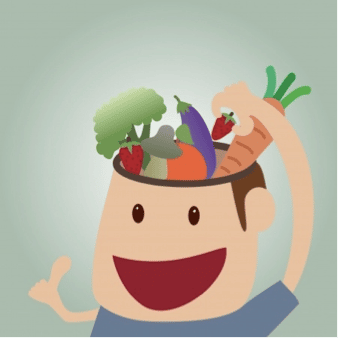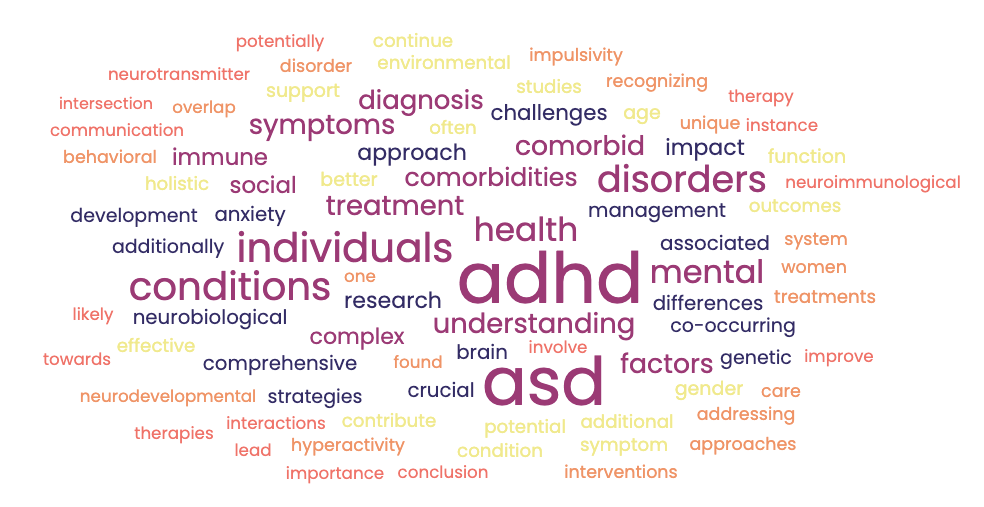Did you know that your brain uses 20% of your body’s oxygen calories despite being only 2% of your body’s weight? (1) Whether you are awake or asleep, your brain is constantly demanding nutrients and energy to function. And where do we get these nutrients you say? Yes, from food!
Researchers have known for a very long time that what you eat has the potential to affect your mood, cognition, awareness, and overall mental health, yet it is rarely mentioned when mental health conditions, such as depression and anxiety, arise. This may be because nutrient depletion is difficult to recognize. Scientists have proposed that an individual in good health may be depleted of nutrients for a substantial amount of time, months to years, before signs and symptoms begin to occur (2), however, long term depletion can lead to permanent damage. So how do we support our mental health and fuel our brains long term? Through wellness!
These simple steps can get you started on the road towards a healthy mind:
1. Sleep. Sleep. Sleep. Despite contradicting evidence, it is recommended that adults get 7-8 hours of sleep each night (3). Your body is working all day and your brain never stops. Your brain needs sleep!
2. Increase fruit and vegetable intake. Fresh foods are packed with antioxidants and other vitamins and minerals that help your body prevent damage to your brain caused by stress. They also help your brain make chemicals needed to feel joy and euphoria, like norepinephrine and serotonin.
3. Get your daily dose of healthy fats. The cells in your brain are all surrounded by layers of fat, also known as lipids. In fact, 10-12% of your brain is made of lipids. (4) Eating foods high in omega-3 fatty acids can support brain health. (5), (6) Avocados, walnuts, olive oil, and wild fish are some of the best sources of healthy fats and fat soluble vitamins that are also important in keeping the brain healthy.
4. Spend time in the sunlight. Fifteen minutes a day can go a long way as it will help your body make vitamin D. (7) Although not fully understood, vitamin D acts on areas of the brain that are linked to mental health conditions, like depression and Alzheimer’s Disease. (7) This is one vitamin that is not naturally in many foods, so if you are a person that should avoid exposure to sunlight (or live in northern parts of the world (8)), you should consider supplementation and look for foods fortified with vitamin D, like milk, yogurt and juices.
5. Increase physical activity. It helps get your blood pumping and brings necessary oxygen to your brain. The more you do, the more efficient your body is at using oxygen.
6. Drink water! Your brain is 77-78% water. (4) Hydration is key to keeping your neurons firing quickly and efficiently throughout the day.
7. Eat foods rich in vitamin B12 and iron. Vitamin B12 helps build strong neurons and promotes your ability to reason and problem solve (9) and iron is needed to bring oxygen to all your living cells. (10) Animal proteins, such as chicken and beef, are great sources of these nutrients. Other good sources include eggs, spinach, tofu, and beans.
8. Limit alcohol and caffeine. Research has shown that alcohol can contribute to depression, memory loss and anxiety. (11) Caffeine can worsen anxiety, agitation and sleep disorders. (12) Many people crave these things, but the body does not need them!
Stay tuned for more on nutrition and your health!
REFERENCES
1. Clark DD & Sokoloff L (1999). Basic Neurochemistry: Molecular, Cellular and Medical Aspects, eds. Siegel GJ, Agranoff BW, Albers RW, Fisher SK & Uhler MD. Lippincott, Philadelphia, pp. 637–670.
2. Leyse-Wallace R (2013). Nutrition and Mental Health. Boca Raton, FL: CRC Press.
3. National Heart, Lung, and Blood Institute, Department of Health and Human Services (2012, Feb 22). How much sleep is enough? Retrieved from http://www.nhlbi.nih.gov/health/health-topics/topics/sdd/howmuch
4. McIlwain H & Bachelard HS (1985). Biochemistry and the Central Nervous System, Edinburgh: Churchill Livingston.
5. McNamara RK & Strawn JR (2013). Role of long chain omega 3 fatty acids in psychiatric practice. PharmaNutrition; 1(2): 41-49.
6. Freeman MP, et al. (2006). Omega 3 fatty acids: evidence basis for treatment and future of research psychiatry. Clin Psychiatry; 67(12): 1954-1967.
7. Vitamin D Council (2013). Does vitamin D play a role in your health condition? Retrieved from http://www.vitamindcouncil.org/health-conditions/
8. Huotari A & Herzig KH (2008). Vitamin D and living in northern latitudes – an endemic risk area for vitamin D deficiency. Int J of Circumpolar Health; 67(2-3): 164-178.
9. Louwman MWJ, van Dusseldorp M, Fons JR, et al. (2000). Signs of impaired function on adolescents with marginal cobalmin status. Amer J Clin Nutr; 72(3): 762-769.
10. Linus Pauling Institute (2015). Iron. Retrieved from http://lpi.oregonstate.edu/infocenter/minerals/iron/
11. American Psychological Association (2015). Understanding alcohol use disorders & their treatment. Retrieved from http://www.apa.org/helpcenter/alcohol-disorders.aspx
12. Winston AP, Hardwick E & Jaberi N (2005). Neuropsychiatric effects of caffeine. Advances in Psychiatric Treatment; 11(6): 432-439.







